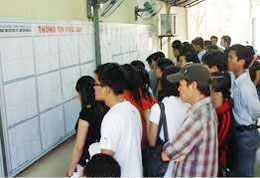Vietnam Employment Trends Report 2010 launched
 |
| illustration photo |
It is the second in an annual series of reports that highlight recent labour market gains, and reveal the patterns of employment impacting on decisions of policy-makers and investors alike. The report also sheds light on the extent to which employment objectives are being achieved in Vietnam.
The report was prepared by the National Centre for Labour Market Forecast and Information, part of the Molisa’s Bureau of Employment. Technical support came from the International Labour Organization (ILO) through the Labour Market Project – an European Union funded initiative.
Nguyen Thi Kim Ngan, Molisa Minister highly appreciated the achievements of the report regarding the analysis of labour market performance, trends of employment, unemployment and underemployment during 2007-2009, which serve as a basis for more effective labour market policies in the years to come.
Rie Vejs-Kjeldgaard, director of ILO Office in Vietnam underlined: “Labour market information and analysis is a key factor in creating more and better jobs, helping investors and decision makers have a clear picture of employment trends. Decent Work is widely seen as the most sustainable way to lift people out of poverty and is correspondingly a key target of the Millennium Development Goals (MDGs).
“The Vietnam Employment Trends Report brings together an important collection of relevant data and analysis on Vietnamese labour market. The labour market information system behind the report will continue to offer sustained benefit to the future of Vietnam, by offering a timely and ongoing overview of the changes that are taking place,” she said.
Ambassador of the European Union to Vietnam, Sean Doyle said: “As one of Vietnam’s largest markets for its exports and one of its biggest sources of foreign direct investment, the EU sees the efficiency of the labour market as a core element in the continued success of the economic development of Vietnam.”
During the period between 2007 and 2009, Vietnam was challenged by a troubled global economic climate, which had a significant effect on the labour market. Looking at the employed population, several important trends were detected during this period.
Importantly for fight against poverty, objectives of the Decent Work Agenda are being achieved. The proportion of vulnerable employment decreased by 4.3 percentage points due to increasing share of wage and salaried employment (2.9 percentage points) and a decreasing share of own-account work (8.2 percentage points). However, increases in unpaid family work (4.0 percentage points) during this same period went against a declining overall trend in vulnerable employment.
Vietnam has a relatively high employment-to-population ratio, with almost 75 per cent of those aged 15 and above in employment. However, facing global financial instability Vietnam’s labour force participation increased between years of 2007 and 2009. The increasing labour force participation rates for young men and women aged 15-19 years from 37.1 per cent in 2007 to 43.8 per cent in 2009 suggest that a significant number of teenagers are leaving the education system to seek work to support themselves and their families.
The largest sector of employment in Vietnam remains agriculture, forestry and fisheries with employment of nearly 23 million in 2008. However, this shows the structural shift of Vietnam’s labour market away from relatively low productivity, labour intensive agricultural jobs towards higher value-added and more technology and capital intensive industries and service sectors.
For most of the projected future, employment in agriculture, forestry and fishing is likely to decline and will reach a projected level of 21.1 million by 2020. Better qualified and more skilled workers will be needed to fuel this shift, and Vietnam’s growth as a successful middle-income country.
What the stars mean:
★ Poor ★ ★ Promising ★★★ Good ★★★★ Very good ★★★★★ Exceptional
Related Contents
Latest News
More News
- Hermes joins Long Thanh cargo terminal development (February 04, 2026 | 15:59)
- SCG enhances production and distribution in Vietnam (February 04, 2026 | 08:00)
- UNIVACCO strengthens Asia expansion with Vietnam facility (February 03, 2026 | 08:00)
- Cai Mep Ha Port project wins approval with $1.95bn investment (February 02, 2026 | 16:17)
- Repositioning Vietnam in Asia’s manufacturing race (February 02, 2026 | 16:00)
- Manufacturing growth remains solid in early 2026 (February 02, 2026 | 15:28)
- Navigating venture capital trends across the continent (February 02, 2026 | 14:00)
- Motivations to achieve high growth (February 02, 2026 | 11:00)
- Capacity and regulations among British areas of expertise in IFCs (February 02, 2026 | 09:09)
- Transition underway in German investment across Vietnam (February 02, 2026 | 08:00)

 Tag:
Tag:

















 Mobile Version
Mobile Version